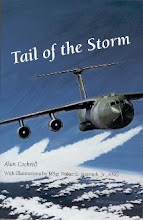I just finished a rather stressful 4-day domestic trip, but I can't tell you why it was thus—some stories are best left in the hangar. Otherwise, it was an uneventful trip to some dull cities that were clad in even duller weather, that made me wish I was back home among sunny skies and dogwood blossoms. But a profound thing happened.
When I got to the United operations center at the
I went out and waited against the wall under the loading bridge to get out of the cold rain. A hearst sat to the side, as did a couple of vans with Marines in them. A bag handler told me the Marines had requested that all bags be unloaded before the coffin, and after that only Marines be allowed in the cargo hold. At a distance, near the far edge of the ramp, other vehicles waited with police escort.
I watched the 757 turn in and glide to a stop, its nose bobbing down as the captain applied the brakes and compressed the nose strut. I don't know why but I always enjoy watching that. I couldn't help but think what an enormous and supremely beautiful airplane it is from such a close ground view. The hearst drivers must have thought so too; they were standing beside their vehicle pointing, gesturing, jabbering—irreverently it seemed, beside the Marines standing at solemn attention.
I moved closer when the last bag was removed and the Marines lined up, four on each side of the belt loader. Then I saw an amazing spectacle. Two high ranking Marines, a colonel and a gunnery sergeant, walked up the loader and got into the filthy cargo hold, got on their hands and knees and draped the flag over the coffin of Lance Corporal Cody Wanken. I was instantly convinced that, had the Commandant of the Marine Corps been there, he would have done that dirty job himself. These people are of a different breed.
The two had difficulty manhandling the coffin onto the belt loader and two United rampers scrambled up to assist. Finally down it came, slowly, on the belt. I heard the gunnery sergeant yell, "Present Arms!" and saw the sharp salutes go up. Instinctively, so did mine. As the coffin arrived in front of the honor guard they lowered their salutes, very slowly, and took the handles. The dazzling red white and blue draped coffin and the brassy Marines' dress uniforms made a compelling contrast with the colorless airport shrouded with low hanging clouds and depressing drizzle.
As they carefully placed the coffin in the hearst I saw the gathering in the distance. TV cameras were pointed our way. Several people were crying. One young man was convulsing with great sobs. Three people stood out in front of the crowd, a man and a woman with another person standing behind them holding an umbrella over them. The man hovered over the woman, clutching her. He stood tall, wearing everyday clothes and a ball cap. The woman was holding a handkerchief to her face. I wondered what they were thinking. Were they proud, angry, or just numbed? And I wondered what it would be like to stand in their place watching one of my sons being taken off that aircraft.
What I was watching was a sight that had been repeated at the

It didn't seem right for me to photograph what I saw, as I was standing very close. I found this picture of a similar ceremony on the internet.
While I was searching for the above picture, I found this one. If this dead soldier could see, this is what his last sight of his mother would be.




